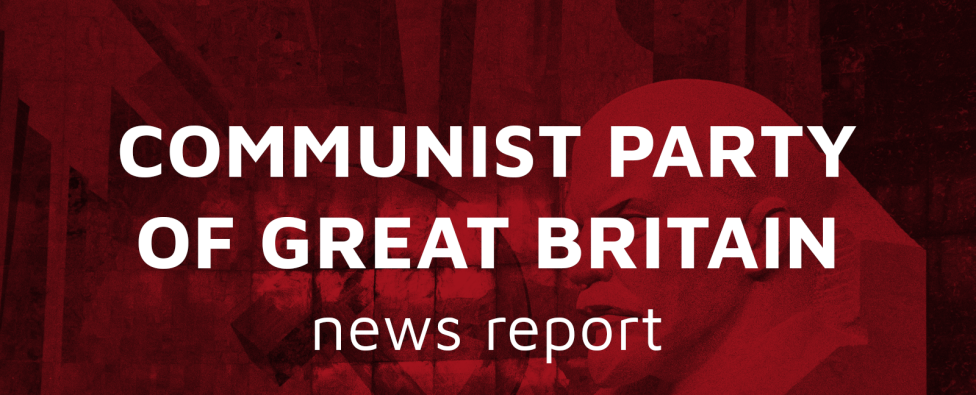
Report on the 202312 CPGB AGM which which was held on February 12 and discussed political perspectives and voted for our Provisional Central Committee. This report was originally published in WW1430, which can be found here. The agreed Perspectives document can also be found on our website here
Period of complex contradictions
CPGB members met on February 12 for our annual general meeting, where we discussed political perspectives and voted for our Provisional Central Committee. There was general agreement on the perspectives, but the proposed amendments brought out some productive discussion – particularly on imperialism and the nature of China, the Labour Party, and our international work.
Jack Conrad opened on behalf of the PCC. We are living in a strange period, he stated, beginning in 1914-17 – one which encapsulates a transition from capitalism to communism, or else barbarism. This period has seen a crushing, world-historical defeat of the left, and produced a whole host of political dead ends and strange turns. The increasingly hostile environment in the Labour Party, pressing geopolitical questions, and the uptick in the class struggle are all interrelated phenomena, and comrade Conrad addressed each of them in turn. On all these questions, the left is showing its weaknesses.
The comrade also emphasised the danger posed by the possibility of “climate socialism” – turning popular demands for a solution to the climate question into a reactionary form of state rule, in which the working class would have little independent power. We continue to live under global capitalism, and the climate crisis continues to deepen. To address this, we need to merge the ecological movement with the working class movement for communism. To this end, the CPGB will be producing The little red climate book in April.
Amendments
Moving an amendment to paragraph 2 of the perspectives, Anne McShane suggested that, rather than calling China “proto-imperialist”, we should call it “quasi-imperialist”. She suggested that if we are to understand China as non-capitalist, at the same time recognising that it is carrying out activity in Asia, Africa and elsewhere which could be characterised as imperialist, then “quasi” as a prefix is better because it recognises the contradictory character of China, and does not imply any kind of inevitable transition to outright capitalist imperialism.
The comrade brought up Lenin’s understanding of imperialism and argued that if we use this framework, we should not use that term to describe China. Whatever the case, she emphasised the need for us to seriously study this question in more depth – ideally before making any pronouncements about its capitalist or imperialist character. The amendment was eventually rejected, but achieved its purpose of generating discussion and several interesting arguments were made.
The comrades who spoke on this question all agreed that China has many capitalist features – or perhaps a “combined form” which is tending towards full-scale capitalism. PCC member Farzad Kamangar added specifically that there is a lot of work being done on it by individual comrades in the CPGB as well as in Critique, also noting the question’s importance for Iran. She explained that China’s financial dealings in Africa are plainly imperialist, exploiting African workers’ labour for resource extraction (for use in Chinese industries like computer manufacturing) and then charging them for the privilege of being exploited through interest on loans. If anything, “proto” is too soft, she thought.
Mike Macnair also made some substantial comments on the question. He pointed comrades to his Weekly Worker series on the question of imperialism, wherein he explains his disagreement with common formulations, including the Lenin conception cited by comrade McShane. The dynamic towards imperialism flows from the dynamic towards capitalism, which is powerful in China. China is increasingly capitalist, but it still has a large Stalinist state sector, which, while producing strong workers’ protests, does not tend to throw up strong trade unionism. Instead of independent working class politics, we typically get an appeal for good bureaucrats against bad.
In moving her second amendment – on Iran – comrade McShane was concerned that the current wording in paragraph 6 of the perspectives appeared to suggest that the ‘Women, life, freedom’ slogan did not emerge organically from the movement, which she thought was incorrect. While it is a weak slogan – cooptable by liberal and even reactionary forces (an ayatollah has come out in support of it, after all) – it can nevertheless be seen as a positive development that Iranian people are connecting women’s emancipation with the need to radically transform Iranian society. However, the comrade withdrew the amendment after a fruitful discussion, in which others’ arguments convinced her.
Comrade Kamangar responded to the amendment by reiterating her opposition to the ‘Women, life, freedom’ slogan and its weaknesses – she thought that comrade McShane’s wording implied we support it. The slogan was created in a particular historical moment, cooked up by the Kurdistan Workers Party (PKK) at the exact time they supported US intervention in Syria.
Comrade Macnair noted that such slogans commonly emerge from a movement because some people think it looks like a nice, bourgeois-democratic, liberal demand. It is wrong to make too much of the fact that it emerges from the movement, he said. We do not support slogans or policies because they emerge organically or because large numbers of the working class support them: we support them if they are in line with our politics.
Jack Conrad emphasised the context of time and place regarding how we judge one slogan versus another. For example, ‘Land, bread and peace’ would not be very useful now, but in a specific time and place before the Russian Revolution it meant an alliance with the peasantry, a stance against the landlords, feeding the cities, and ending the inter-imperialist war. In Iran, Kurdistan, Syria and so on, ‘Women, life, freedom’ is not revolutionary. We are not denouncing ordinary people – some of whom are dying in the name of that slogan – we are on their side: but we try to take people to the next stage.
Bob Paul regretted that the perspectives did not say anything about Labour Party Marxists. But several comrades expressed the feeling that the Labour Party is not a useful site for struggle at the moment. It remains a bourgeois workers’ party, but the workers’ pole has been dramatically weakened, and even with the strike wave and a growing union membership the trade union bureaucracy still does not seem to want to intervene in any effective way when it comes to the Labour Party.
Comrade McShane’s final amendment was on international work and the need to continue our commitment to study the women’s question. The amendment passed unanimously and uncontroversially. However, the broader question of international work did prompt some discussion about organisational matters and the CPGB’s social media presence. Comrades broadly agreed that the YouTube channel has been going along well, and that the unofficial Discord was and remains a generally positive development. More work is needed, and we still do not have a presence on any public microblogging platform besides Facebook.
There was some frank discussion of editorial decisions in the Weekly Worker and how we should go about criticism, external-facing transparency, how we present our ideas rather than just what our ideas are, and the necessity or not of “reaching out” via informal channels when criticising in writing what has been written elsewhere. Some of these questions will doubtless continue at future aggregates.
Comrade Kamangar in particular encouraged comrades to remember that we are not out to build an “oil slick international”. Indeed we do not and should not have any plans to intervene in or aim to control the decisions of other organisations. Our international work is primarily about discussion, and intervening in the paper by variously criticising or supporting our international comrades’ political ideas. Furthermore, complex international questions and coordination can really only be dealt with properly by prioritising more formal discussion in writing, through motions, letters and articles.
National question
Ollie Hughes had submitted two amendments. The first was on the wording in paragraph 17 of the perspectives document, which he thought could be read as supporting a federal republic of England, Scotland, Wales and Ireland in one large union. We need to be clear on our demands. But the amendment was overwhelmingly rejected on the basis that the original wording was considered perfectly good, with just three comrades voting in favour.
The discussion had included a somewhat unfocused debate of when and where to emphasise minimum versus maximum demands in relation to national questions – prompted by the contrast between the conceptions of a ‘United States of Europe’ and a ‘Thirty-two county socialist Ireland’, which it may be positive to discuss again in the future, but with a more direct focus.
James Harvey explained that there have historically been differing views in Ireland on the question of ‘unification’ versus ‘reunification’. The predominant view in “nationalist Ireland” was for reunification, historically, because it was Britain that partitioned Ireland. The argument was that there is an organic unity that must be restored and many republicans in the north also used ‘reunification’. Echoing the general pushback on “slogans coming out of the movement” as a positive marker, comrade Harvey criticised the Socialist Workers Party in Ireland for tailing Sinn Féin on the border poll – in other words, encouraging unification through a bourgeois process; we have to agitate for something much more transformative, he contended. Comrade McShane agreed, arguing that anything in Ireland should be raised in the context of Europe.
Comrade Hughes’s other amendment was on removing the reference in paragraph 16 of the perspectives to the role of the Gender Recognition Reform Bill in the ongoing furore over the Scottish independence question. He argued that this process towards more direct clashes between Westminster and the Scottish Parliament began before the bill was shot down and will continue after it, and referencing it in the document is likely to become dated fairly soon.
Mike Macnair pointed out that the content of the bill is likely to be a thorny issue for some time and comrade Conrad concurred that this is likely to continue as an issue. Furthermore, the gender question is likely to be more successful in splitting, not strengthening, the SNP, for whom it is a weak point – just like ‘anti-Semitism’ was for Corbyn. The amendment seeking to remove mention of the Gender Recognition Reform Bill was rejected, with once again three comrades voting in favour.
Finally, just a word about the election of the PCC. Nobody apart from the four outgoing members contested and each was re-elected with not a single vote against.
Scott Evans
